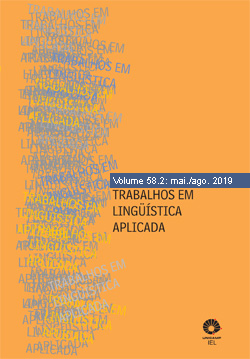Resumo
Este artigo se propõe a apresentar características da perspectiva pós-humanista e relacioná-las a entendimentos contemporâneos sobre linguística aplicada e estudos de letramentos, com atividades preliminares nessa direção e indagações para futuros estudos. Como estudos interdisciplinares, o pós-humanismo se inspira no conceito de assemblage de Deleuze e Guattari (2005) e vem ganhando relevância de acordo com teóricos como Barad (2007), Braidotti (2018), Bennet (2010), Pennycook (2018), dentre outros. Uma das preocupações desses estudiosos é o futuro da pesquisa, ensino, aprendizagem de/em línguas/linguagens e práxis em termos filosóficos, transculturais e educacionais. Barad (2007), Bennet (2010) usam os termos humanos e nãohumanos enquanto Braidotti (2018) e Pennycook (2018) registram humanos e não-humanos. Às vezes, Bennet (2010) prefere humanos-nãohumanos para enfatizar a ideia de assemblage. Consideram tais agentes em assemblage vibrante em meio a uma gama ampliada de complexidades semióticas, espaciais e éticas na emergência do humanismo pós-humano, conforme argumenta Braidotti (2018). Isso requer uma linguística aplicada e estudos de letramentos dispostos a reconhecer que eles próprios são produtos de tais emaranhamentos, para os quais uma revisão de ontologias influenciando epistemologias e metodologias mostra-se produtiva.
Referências
BARAD, K. (2007). Meeting the universe halfway: quantum physics and the entanglement of mater and meaning. Durham, N.C.: Duke University Press.
BARAD, K. (2012). “Intra-actions” (interview of Karen Barad by Adam Kleinmann). Available at: <https://www.academia.edu/1857617/_Intra-actions_Interview_of_Karen_Barad_by_Adam_Kleinmann.> Access on: December 10 2018.
BARAD, K. (2003). Posthumanist Performativity: Toward an Understanding of How Matter Comes to Matter. Available at: <https://www.uio.no/studier/emner/sv/sai/SOSANT4400/v14/pensumliste/barad_posthumanist-performativity.pdf>. Access on: January 15, 2019.
BRAIDOTTI, R. (2018). The posthuman. Cambridge: Polity Press.
BENNET, J. (2010). Vibrant matter. A political ecology of things. Durham, NC: Duke University Press.
CANAGARAJAH, S. (2013). Translingual practice: global Englishes and cosmopolitan relations. New York, London, Routledge.
DELEUZE, G.; GUATTARI, F. (2005). A thousand plateaus: capitalism and schizophrenia/Gilles Deleuze, Felix Guattari; translation and foreword by Brian Massumi. Minneapolis: Published by the University of Minnesota Press, 2005.
FREIRE, P. (2011). Pedagogia do oprimido. 50ª. ed. Rio de Janeiro: Paz e Terra.
FREIRE, P. (2017). Pedagogy of the oppressed. 50th anniversary edition. Translated by Myra Bergman Ramos. With an introduction by Donaldo Macedo and an afterword by Ira Shor. New York: Bloomsbury Publishing Inc.
HACKETT, A.; SOMERVILLE, M. (2017). Posthuman literacies: young children moving in time, place and more-than-human worlds. Available at: https://e-space.mmu.ac.uk/618199/3/Moving%20in%20time%20and%20place%20FINAL%20%20March%202017%20(4).pdf. Access on: January 15, 2019.
JONES, A.; HOSKINS, T. K. (2016). A mark on paper: the matter of indigenous-settler history. In: TAYLOR, C.; HUGHES, C. (Eds.) Posthuman research practices in Education. New York: Palgrave Macmillan, pp. 75-92.
KRESS, G. (2003). Literacy in the New Media Age. New York, London: Routledge.
LATOUR, B. (2005). Reassembling the social: an introduction to actor-network theory. Oxford: Oxford University Press.
LIVESEY, G. (2010). Assemblage. In: PARR, A. (Ed.) Deleuze dictionary. Revised edition. Edinburg: Edinburg University Press, pp. 18-19.
MIGNOLO, W. (2000). Local histories/global designs. Coloniality, subaltern knowledges, and border thinking. Princetown: Princetown University Press.
MIGNOLO, W. (2010). The geopolitics of knowledge and the colonial difference. Disponível em: <http://waltermignolo.com/the-geopolitics-of-knowledge-and-the-colonialdifference/>. Access on January 17, 2019.
MITHCELL, D. T.; SNYDER, S. L. (2015). The Biopolitics of Disability: Neoliberalism, Ablenationalism, and Peripheral Embodiment. Ann Arbor: University of Michigan Press.
(2018). Posthumanist applied linguistics. New York: Routledge.
PENNYCOOK, A. (2007). A linguística aplicada dos anos 90: em defesa de uma abordagem crítica. In: SIGNORINI, I.; CAVALCANTI, M. (Orgs.) Linguística aplicada e transdisciplinaridade. Campinas: Mercado de Letras.
PENNYCOOK, A.; OTSUJI. E. (2015). Metrolingualism. Language in the city. London, New York: Routledge.
PHILIPS, J. (2006). Agencement/Assemblage. Available at: <http://www.urbanlab.org/articles/Philips%20asse,blages.pdf>. Access on: December 20, 2018.
ROBERTS, T. (2012). From ‘new materialism’ to ‘machinic assemblage’: agency and affect in IKEA. Available at: < https://journals.sagepub.com/doi/10.1068/a44692>. Access on: January 31, 2018, from.
SANTOS, B. de SOUSA. (2018). Para uma nova visão da Europa aprender como sul. In: SANTOS, B. de SOUSA; MENDES, J. M. (Orgs.) Demodiversidade. Imaginar novas possibilidades democráticas. Belo Horizonte: autêntica, 2018, p. 51-72.
SOUZA, L. M. T. (2011). Para uma redefinição de letramento crítico: conflito e produção de significação. Available at: <https://www.researchgate.net/publication/236003625_Para_uma_redefinicao_de_letramento_critico_conflito_e_producao_de_significacao.> Access on: January 19, 2019.
SOUZA, L. M. T. (2005). The ecology of writing among the Kashinawá: Indigenous multimodality in Brazil. In: CANAGARAJAH, S. (Ed.) Reclaiming the local in language policy and practice. Mahwah NJ: Lawrence Erlbaum, pp. 73-95.
TAYLOR, C.; HUGHES, C. (Eds.) (2016). Posthuman research practices in Education. New York: Palgrave Macmillan.
TAYLOR, C. (2016). Edu-crafting a cacophonous ecology: posthumanist research practices for education. In: TAYLOR, C.; HUGHES, C. (Eds.) Posthuman research practices in Education. New York: Palgrave Macmillan, pp. 5- 24.
THORBURN, E. D. (2015). Human-Machinic Assemblages: Technologies, Bodies, and the Recuperation of Social Reproduction in the Crisis Era. Available at: <https://ir.lib.uwo.ca/cgi/viewcontent.cgi?article=4331&context=etd>. Access on: January 13, 2018.

Este trabalho está licenciado sob uma licença Creative Commons Attribution 4.0 International License.
Copyright (c) 2019 Trabalhos em Linguística Aplicada


